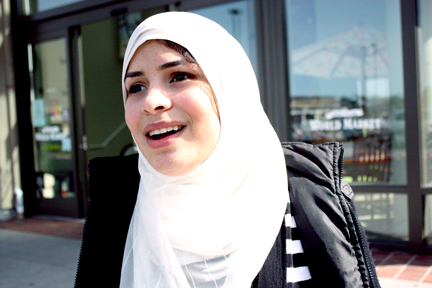Peace between Palestine and Israel is possible
By Robert Romano
The Guardsman

Mariam El-Shafai, 16, is back home in Gaza with a new faith in humanity and Americans specifically.
El-Shafai came to the U.S. to receive medical attention through the Palestine Children’s Relief Fund, an American nonprofit organization that funds medical treatment for children in Palestine.
“I was a student in 10th-grade. My injury happened during an assault on Gaza. On Jan. 4, 2009, I was sitting, in the morning, in our kitchen eating breakfast when the Israeli military bombed our home and I was hit by a flaming hot shrapnel in my left eye,” El-Shafai said.
Israeli-born Tami Etziony, an environmental studies major at City College who moved to the U.S. after completing her mandatory military service, said she has always been appalled by Israel’s treatment of Palestine.
“I have learned much since leaving Israel about the Palestinian plight and the horrendous treatment of Palestinians by Israel,” she said. “Even then, instinctively, I knew that if I was born Palestinian I would either become a terrorist or leave the country.”
Although excited to come to the U.S., El-Shafai was confused that an American organization would be fully funding her treatment. She was equally surprised that two Jewish doctors would be performing her surgery.
“When I came here I did not know that people here supported peace and freedom for Palestine,” she said. “I came to the U.S. and I saw the face of the American people. Many Americans are against the Israeli Government, including all colors and all religions.”
There are many victims out there, including the Israeli people, but if a 16-year-old Palestinian girl who lost her eye to an act of Israeli aggression believes unity is possible, then it is.
Our American government spends $3.55 billion per year in military aid that supports genocide by attempting to wipe out the Palestinian people, including El-Shafai.
This massacre in Gaza started on Dec. 27, 2008 and continued until Jan. 18, 2009. Gaza suffered $6 million worth of damage to water and waste-water infrastructure according to Amnesty International.
El-Shafai spoke Feb. 6, 2010 at a Gaza commemoration in Burlingame that was a fundraiser for the Middle East Children’s Alliance, which brings water purification systems to schools in Gaza.
The Netanyahu administration refuses to stop displacing Palestinians in a systematic plan to claim all the land for themselves. U.S. policy can no longer be one of excusing Israel for war crimes. Every one of us must stand up for El-Shafai and the estimated 4 million other Palestinians who are threatened with extinction because the world refuses to act.
After interviewing El-Shafai, I was given hope that peace is achievable in Palestine and that through individuals like her a one-state solution is possible. She has promised to promote the idea of a solution that does not involve bloodshed, one which does not include Israeli fighter jets and Palestinian hand grenades.
My experience with El-Shafai left me with the idea that no one country has to win. There is a solution besides war. If human beings can work together toward peace we can finally achieve it.
The situation in Palestine is a humanitarian issue that can no longer be avoided. We must raise our voices collectively and demand that the Israeli government not be allowed to indiscriminately commit genocide in the guise of defense.
“Seeing is believing,” said Hatem Bazian a UC Berkeley professor of near eastern studies. “The best way for Americans to help is to visit Palestine. To see the negative effect U.S. policy is having on the Palestinian people.”
El-Shafai is now back in Gaza, according to Nadel Saleh, who acted as surrogate father during her stay in America.
“She sounded happy to see her family. However, Israeli war planes were heard,” Saleh said.

Comments are closed.